Erewash Conservative Association
Tory PPC Gregor Macgregor’s Letters and Press Releases
Gregor Macgregor in South Africa
The impression one has of South Africa, before visiting, is of a European country in Africa. The reality is a little different. If one were to sum up South Africa in a short phrase, it would be "An African Country, which still has links to Europe, that work."
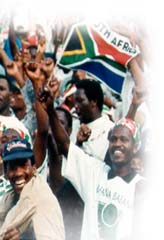
Nowhere can one get away from the belief that this is not a European country, by which I generally mean "white", it is an African country. At the airport most of the people you see are African, the customs officials are African and the taxi drivers are African.
It’s by talking to the taxi drivers, as one does, one really sees the difference. My taxi driver was called Percy; his family lives in Transvaal near Pietersburg. He only gets to visit his wife once every other month. For someone with some money it involves a five-hour drive. For him it can be up to a day’s journey.
Taxis
He has to use the euphemistically called "taxis" to get home. These are minibuses that hold 16 people. Drivers with special licences, which are relatively easy to get, drive them. They can take you anywhere!
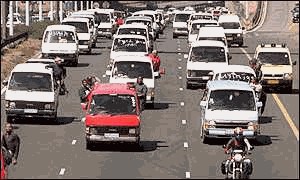
The taxi waits at the start point until it is full and then journeys on its pre-designated route until one gets to the end. There are pickup points, but one can be set down where ever one likes, so long as it’s on the route. The process is a bit "hit and miss", so there can be a long delay before a taxi can arrive. In addition if the taxi is full there is no guarantee of a seat. You have to arrive early!
It can also be dangerous. There is a feud going on in Cape Town between rival groups, routes are contested and that means violence. A number of people were killed recently, when a taxi was shot up by a rival group. Now one firm, which provides services into a contested area, has had to employ armed response guards to protect its vehicles.
Travelling on these taxis can also be dangerous because there are lots of accidents and often they involve overloaded taxis crashing or being crashed into. Because they are always full and there is not much room, injuries are common. Many are old and do not have the protection provided by newer vehicles. They are often so poorly maintained that accidents are caused by tyres bursting.
So why do people use this form of transport? It is cheap. One ride covering up to ten miles can cost as little as 2 Rand - about 20 pence. Since most workers receive very little money this forms an affordable form of transport, even if one has to use up to three taxis to get to and from work.
Crime
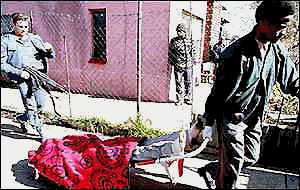
One of the biggest problems in South Africa is crime. Johannesburg looks like a prison camp, or rather like a collection of very small camps. The houses are surrounded by high walls topped with barbed wire or razor wire. Almost all advertise one or another of the "Armed Response" companies.
These companies work from their alarm central stations and come out if the alarm in a customer’s house gives a signal to the central station. The target time is three minutes from alarm to a car arriving. It is important that this is met, as sometimes it is a life and death situation.
Life appears to be cheap in South Africa. The Finance Director of the company I visited was shot dead in a bank raid a couple years ago. Many colleagues have friends that have been killed for little more that a few Rand.
Many people have had cars stolen and most have suffered some attempt to raid their houses. One employee saved for six years to buy a car. It made his life much easier. He could get to work in just an hour, rather than the three hours he spent in taxis. It lasted for just two months before being stolen. With no money to pay for insurance, he had nothing to fall back on, other than the taxi service, which he had been saving to avoid using.
Guns and Crime
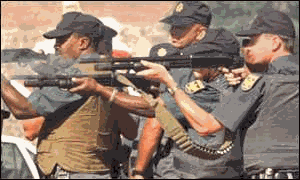
There are lots of guns in South Africa. People carry concealed guns to protect themselves. One taxi driver (Mercedes rather than minibus!) carries a pistol concealed in his glove compartment. He has already shot three bandits that have attempted to rob his taxi. The police congratulated him on the third, since they had not been able to catch him!
Even the armed response vehicles are not immune to this banditry. A vehicle was held up in a township and both officers shot. The target was not the vehicle, but the guns inside. Another officer, returning to a customer’s house after seeing off a burglar, was shot and badly injured by the terrified householder. He had come back to console the victim; he ended up being shot instead.
Crime is also driving businesses away from the downtown area of Johannesburg. Employees working late are concerned about the risk of them being mugged on the way home. There are frequent break-ins and transport, whilst being better than for destinations elsewhere in the city, is not good.
The result has been a flight to the northern suburbs. Sandton and Midrand have seen a massive boom in office development over the last ten years. These areas are safer, but it is still unsafe to walk the Sandton streets after dark.
Why has this arisen? The reasons are simple. The police, who enjoyed little respect after the apartheid era, have been unable to cope with the increase in crime. The courts are hopelessly overworked and inefficient. The whole apparatus is prone to corruption; there are stories that R5,000 (Ł500) can get you off a murder charge. The removal of the death penalty has removed the main deterrent for murder.
Finally and most importantly the massive unemployment (40%) and the almost complete lack of social security, has led to some having no alternative to a life of crime. They have had little education, as they were involved in the schools boycott. The education was not very good in any case for those who did attend. Literacy rates are very low in the African community and the jobs on offer require an education.
The whole crime situation was summed up by an article in a Johannesburg newspaper, which described the death of a well-known black radio DJ. His neighbour heard noises in the neighbouring house so he called the police. TWENTY-FOUR HOURS LATER the police arrived to find that the man had been bludgeoned to death. When questioned as to what he would, the local police chief shrugged his shoulders and said "nothing".
Emigration

Most newspapers have advertisements for emigration from South Africa and around 100 per week leave, never to return. This is for a number of factors; crime is high among them. The fear of crime has been replaced by a grim form of fatalism, but in the end the fear wins and many decide to leave.
Unemployment is another reason. Lack of work does not just affect the African community; Europeans also suffer. Companies have been encouraged to adopt positive discrimination programmes to promote Africans into prominent positions. This has meant that middle aged managers, who loose their jobs, find it difficult to work again. There is little social security for them either!
The initial outrush was of those racialists, who supported the apartheid regime. They left because they could not face an African South Africa.
The problem now is that ordinary people are leaving. Without their resources, the country will suffer. Education needs to improve for ordinary South Africans and until it does, there will not be enough Africans to fill the management posts that are going vacant as people leave.
The Zimbabwean Elections
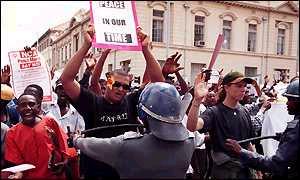
Many people and not just Europeans are worried about what is going on in Zimbabwe. The world condemnation of Zimbabwe, the violence caused by the squatters and the rigged election have worried all people in South Africa. They are concerned that it does not happen there, they have a lot to loose.
The Government’s charitable attitude to the thuggery in Zimbabwe has worried many. They believe that the government, whilst being supportive of their colleagues in Zimbabwe, should be more combative in saying what the right course should be.
The Future
There is a tremendous potential for South Africa to benefit from the position it enjoys as the engine of Southern Africa. What it has in terms of head offices and regional offices easily surpasses all the other countries in the region put together. It is however loosing its position as a result of crime, positive discrimination and corruption.
For all its troubles there is a degree of racial integration that is greater than almost any other country in Africa. The changes over the last ten years have been phenomenal.
There is still a long way to go, but the main differences are those of education, status and wealth rather than of race. This brings South Africa much nearer to the norm for most countries. It also means that as the African population improves in all these areas, there will be fewer bars to their upward mobility
This change can be best seen in Soweto. This township for such a long time was a centre for racial discord against the apartheid regime. Part of it is now a respectable place to live. It still has its poor area, but the growth is in new high quality houses for the up and coming African middle classes.
The effect of the increased crime is that the Africans have also suffered. The townships, where so many of them still live are better connected to the centre of Johannesburg. The change in employment patterns, with so many companies moving out of the centre to the northern suburbs, has resulted in massive journeys each day to get to work. It is not unusual for someone to travel three hours a day to work as a sweeper or a tea lady. This will involve two or three "taxis" with all the hanging around that this form of transport involves.
The fall in the Rand has also affected investment. It has made South Africa more attractive for industry. Where things were imported, more are being made at home. The labour force is better trained for manual labour rather than office work as so many of them missed out on a decent education during the schools boycott.
Because of this there is a tremendous way to go. The unemployment rate is estimated to be 40%, this may be optimistic and there are probably many more out of work. These are the people who were given the expectation that everything was going to get better after the ANC took over the government. Managing their sense of disillusion will be a major job for the Government.
The whole thing could explode into a ferment of public disorder, fuelled by the discontent in the townships. This would destroy the economy and reduce the country to third world status. The Government seems well aware of this and is treading a delicate path between placating their supporters and doing what is right for the country.
The most important thing that influences South African politics is that it is now an African country. It will find an African solution to its problems; we wait to see where that will take them over the next decade.